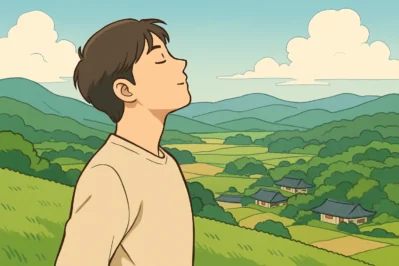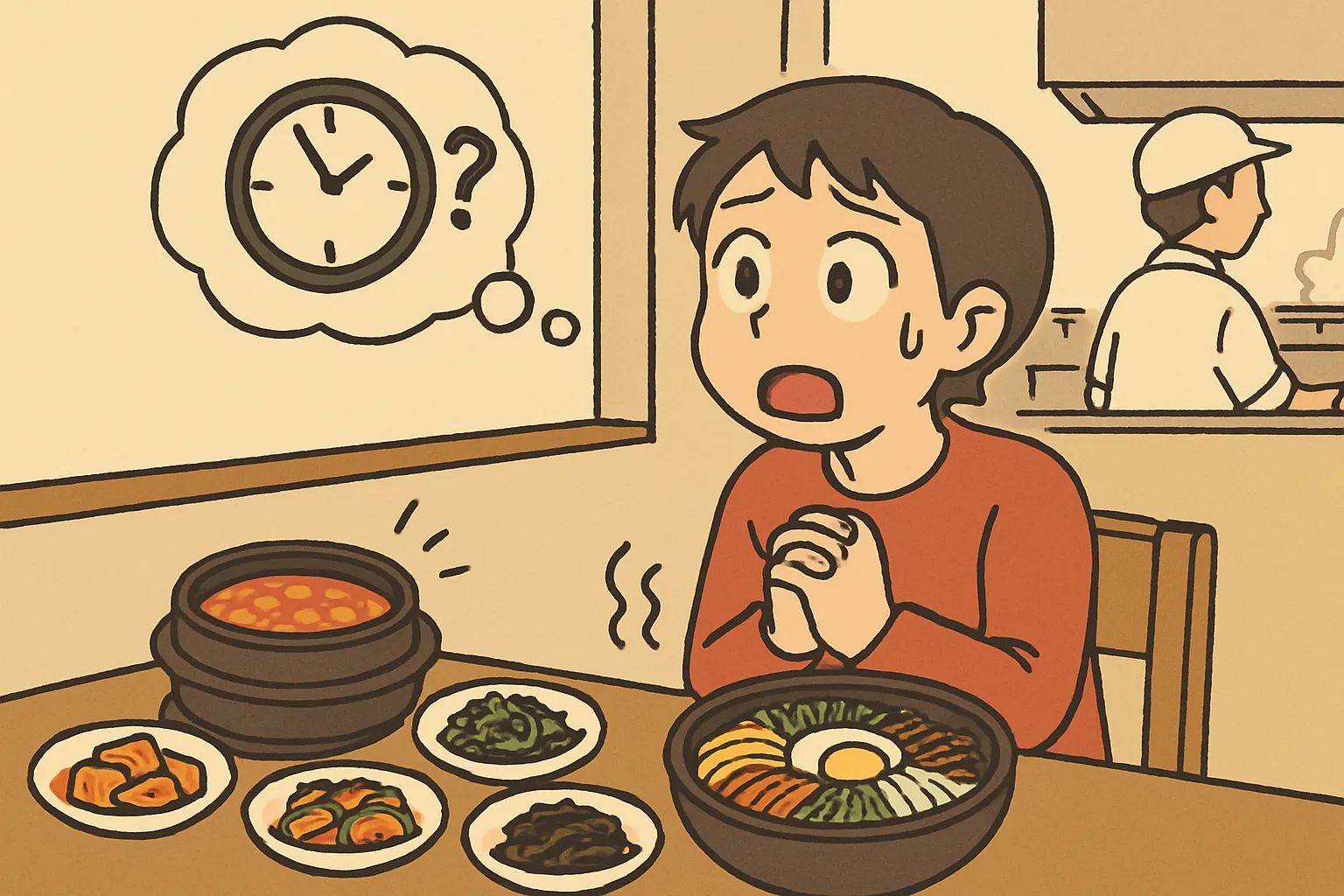Find Your ‘Healing’ in the Korean Countryside!
Hello! Welcome to [Maeil Hangeul], here to upgrade your Korean skills!
Have you ever watched a K-drama and dreamed of escaping the busy city for the beautiful, peaceful countryside? You’re not alone! Lately in Korea, going on “healing trips” (힐링 여행) to nature to relax and recharge is a huge trend. Today, we’ll learn some essential Korean phrases to help you describe the stunning rural scenery, so you can share your feelings just like a local on your next trip or while watching your favorite show!
Ready to find your inner peace? Let’s go!
Core Expressions You Need to Know
Here are three key phrases to express your appreciation for nature.
1. 경치가 좋다 (gyeongchi-ga jota)
* Pronunciation [Romanized]: gyeong-chi-ga jo-ta
* English Meaning: The view/scenery is good.
* Detailed Explanation: This is the most common and essential phrase for appreciating any kind of scenery! 경치 (gyeongchi) means “scenery” or “view,” and 좋다 (jota) means “to be good.” You can use it for mountains, the sea, a field of flowers—anything beautiful you see. It’s a simple, all-purpose compliment for nature!
2. 공기가 맑다 (gonggi-ga makda)
* Pronunciation [Romanized]: gong-gi-ga mak-da
* English Meaning: The air is clear/fresh.
* Detailed Explanation: This phrase is perfect for when you take a deep breath of fresh country air. 공기 (gonggi) means “air,” and 맑다 (makda) means “to be clear” or “clean.” It’s the perfect way to describe the feeling of escaping city pollution and enjoying the crisp, clean air in nature.
3. 마음이 편안해지다 (ma-eum-i pyeon-an-hae-jida)
* Pronunciation [Romanized]: ma-eum-i pyeon-an-hae-ji-da
* English Meaning: My mind/heart becomes peaceful.
* Detailed Explanation: This expression gets to the heart of the “healing” trend. 마음 (ma-eum) means “mind” or “heart,” and 편안해지다 (pyeonanhaejida) means “to become comfortable or peaceful.” You use this phrase when a beautiful view or a quiet moment truly makes you feel relaxed and at ease. It’s a beautiful way to express inner peace.
Example Dialogue
Let’s see how these phrases work in a real conversation! Imagine two friends, A and B, taking a trip to the countryside, just like in the K-drama ‘Hometown Cha-Cha-Cha’.
A: 와, 여기 정말 경치가 좋다! 하늘 좀 봐!
(Wa, yeogi jeongmal gyeongchi-ga jota! Haneul jom bwa!)
(Wow, the scenery is so good here! Look at the sky!)
B: 맞아. 도시랑 다르게 공기가 맑아. 숨쉬기만 해도 기분이 좋아.
(Maja. Dosi-rang dareuge gonggi-ga malga. Sumswigiman haedo gibun-i joa.)
(I know. Unlike the city, the air is so fresh. Just breathing feels good.)
A: 응. 이 소나무 숲을 보고 있으니까 마음이 편안해져.
(Eung. I sonamu sup-eul bogo isseunikka ma-eum-i pyeon-an-hae-jyeo.)
(Yeah. Looking at this pine forest makes my mind feel so at peace.)
B: 이게 진짜 ‘힐링’이지! 우리 여기서 사진 많이 찍자!
(Ige jinzza ‘hilling’-iji! Uri yeogiseo sajin mani jjikja!)
(This is what ‘healing’ is all about! Let’s take lots of pictures here!)
Culture Tip & Trend Deep Dive: The ‘Healing’ Culture
You heard the word ‘힐링’ (hilling) in the dialogue, right? It’s a Konglish word taken from the English word “healing,” and it’s a massive trend in Korea.
For years, Korea has been famous for its “ppalli-ppalli” (빨리빨리), or “hurry, hurry,” culture. But recently, many people, especially the younger generation, are pushing back against the stress and burnout. They are actively seeking out “healing” experiences.
- On Social Media: If you search #힐링여행 (healing trip) on Instagram, you’ll see thousands of posts featuring quiet beaches, green forests, and peaceful countryside cafes.
- In K-Dramas: Shows like ‘Little Forest’ and ‘Hometown Cha-Cha-Cha’ showcase the beauty of a slower, more mindful life away from the city, which has made rural travel even more popular.
So, when you use a phrase like “마음이 편안해져요” (My mind feels at peace), you’re not just describing a scene; you’re tapping into a very modern and important cultural movement in Korea!
Let’s Wrap It Up & Practice!
Great job today! You’ve learned how to talk about beautiful scenery and express feelings of peace and relaxation in Korean. You now know:
* 경치가 좋다 (The view is good)
* 공기가 맑다 (The air is fresh)
* 마음이 편안해지다 (My mind becomes peaceful)
Now, it’s your turn to practice!
Practice Question:
Fill in the blank with the correct phrase from today’s lesson.
You are hiking up a mountain. When you reach the top, you see an amazing view. You say:
“와! 산 정상은 정말 (___________)!”
(Wow! The mountaintop view is really good!)
Leave your answer in the comments below using one of the expressions we learned today! Where is your dream ‘healing’ destination in Korea?






